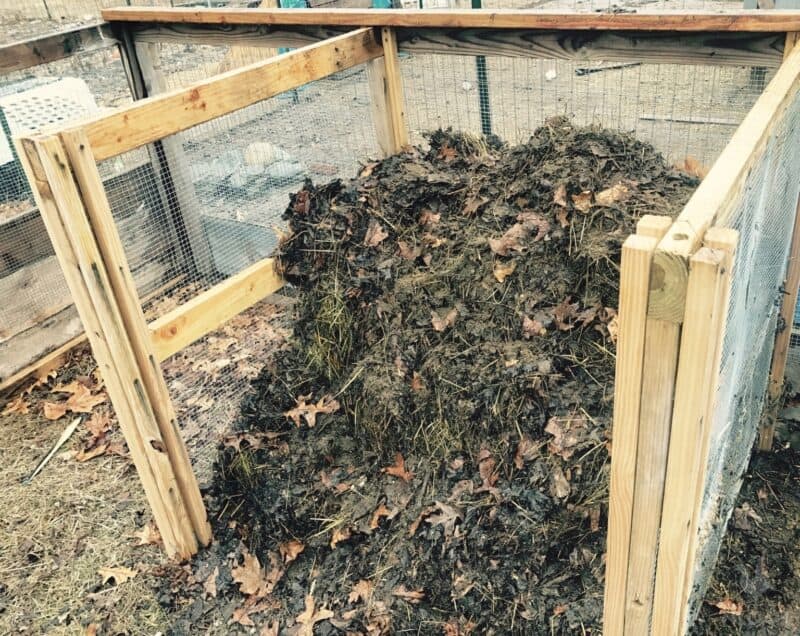As homesteaders, we’re always striving to reduce our carbon footprint and upcycle as much as possible. Nothing goes to waste.
Whenever possible, we find ways to upcycle things and reuse them to the best of our advantage. This includes food waste and other organic materials in and around the homestead.

By composting, we’re taking advantage of improving and amending our soil without using harsh fertilizers. By keeping an eye on what we do compost we’re able to keep a fairly even balance in our soil.
Vegetable scraps, green trimmings such as grass, and other brown materials are basically what comprise our compost. We even add in egg shells and newspapers alongside our coffee grounds and tea bags.
However, that being said, we’ve discovered that there are simply some things that shouldn’t be composted. Some items aren’t safe to compost.
This list should help you to determine whether or not something should be tossed into your compost pile or if you should take special measures prior to tossing it into the compost pile.
Many items simply should not go into the compost pile and you’ll want to make sure that you’re not putting them in for both health reasons (they could make you sick) and to prevent wild animals from going through your compost pile.
Here are some of the major things that should never be placed into your compost pile.
Pets/Farm Animals
Many people mistakenly put pet waste into their compost. It’s one thing to put herbivore pet waste into a compost pile however, keep in mind that it can still be unsanitary.
Small amounts of rabbit manure, chicken manure etc. are commonly placed into compost without any issues. Just keep in mind that it should always be balanced out.
- ❌ Pet waste from carnivorous pets should never be put into the compost pile. Pet waste from herbivores may be placed into compost in reasonable amounts.
- ❌ Deceased pets or farm animals.
Kitchen
It’s easy to get caught up in throwing scraps into the compost pile. Make sure you’re not throwing anything on this list into your kitchen compost. When in doubt don’t toss it into the compost bin. Throw it out instead. It’s always wise to err on the side of safety.
- ❌ No meat scraps (these would also attract wild animals to your compost pile).
- ❌ Grease and oil (this includes paper towels or napkins with grease and oil on them).
- ❌ Vegetable leftovers that have been sauteed in butter or cooked in oils.
- ❌ Milk products.
- ❌ Walnut shells (these contain a toxic compound).
- ❌ Citrus peels (these take a long time to decompose. A few that are minced up are fine but avoid large amounts of citrus peels in the compost pile).
- ❌ Breads and grain products.
- ❌ Fish (this includes leftover fish, fish guts and scales, and bones).
- ❌ Meat products.
- ❌ Cooking oils, butter wrappers etc.
- ❌ Sticky labels found on some fruits and vegetables.
- ❌ Rice
- ❌ Coffee filters (unless they’re biodegradable), coffee grounds are fine).
- ❌ Tea bags (unless they’re biodegradable), however, you can remove the used tea leaves from the bag and compost the tea itself).
- ❌ Fruit juice boxes and containers.
- ❌ Pickles (the additives won’t break down and will change the pH of the compost pile.
- ❌ Coated containers that held mushrooms, tomatoes etc.
- ❌ Empty cereal boxes or empty boxes from other foods (these may contain other components that don’t compost well or could be poisonous).
- ❌ Empty pizza boxes (again, thee are coated, and may have grease on them from the pizza).
Garden
Garden debris is almost always tossed into compost. Just make sure that you’re using discretion when you’re tossing in weeds with seeds and plants that may spread diseases to your entire compost pile.
- ❌ Weeds that have seeds
- ❌ Diseased plants
- ❌ Wood chips that have been chemically treated
- ❌ Sawdust that has been chemically treated
- ❌ Walnut wood/trees
In And Around The Homestead
If your homestead is like ours, you tend to save just about everything that you can in and around the homestead.
It’s easy to get caught up in a spring cleaning and toss in items that maybe shouldn’t be placed into the compost pile.
Keep the items in the list below in mind when you’re on your next spring clean up and avoid placing them into your compost pile.
- ❌ Glossy paper (the coating won’t decompose)
- ❌ Glossy ads from the newspaper.
- ❌ Many magazines have special coatings on them that doesn’t decompose readily.
- ❌ Aerosols (this includes spray paint, hair spray, etc.)
- ❌ Batteries
- ❌ All Chemicals
- ❌ Lined cardboard (milk cartons etc.)
- ❌ Plastics of any kind (bags, twist ties, labels found on fruits and vegetables, milk jugs etc.)
- ❌ Used diapers
- ❌ Used personal products (tampons, sanitary napkins etc.)
- ❌ Coal ashes (wood pile ashes are fine as long as they haven’t been chemically treated)
- ❌ Large pieces of wood (this includes branches, break them down first)
- ❌ Synthetics of any kind (fertilizer, clothing, etc.)
- ❌ Oils (used motor oil etc.)
- ❌ Rubber (old tires, used rubber gloves etc.)
- ❌ Acrylics
- ❌ Torn or shredded clothing that isn’t organic in nature (if the clothing has been dyed don’t compost it).
- ❌ Dyes (this includes papers as well as clothing)
- ❌ Glass
- ❌ Ceramics
- ❌ Medical waste (unused medications, needles, used bandages etc.).
- ❌ Take out containers (whether cardboard or plastic, these have coatings on them that won’t break down).
Unique Things That You May Wish To Reconsider Before Composting
The following list is a guideline only.
Many people successfully toss these items into their compost pile without issues, others, have unique experiences (I’ve shared some of them) and you may wish to reconsider or chop the following items up even smaller if you place them into your compost pile.
Also, make sure that you’re turning your compost pile more frequently if you have any of these items in your compost pile.
- ❌ Potato peelings unless you’re very careful and chop these up you may wind up with a lot of new potatoes. You also may risk viruses and spores that aren’t killed in composting. Before you compost any potato parts, look them over and check for blight, diseased spots, and “eyes”. I once put potato peels into my compost pile and had a bumper crop of very large potatoes in my compost pile. Now, potato peels are chopped up or placed into their own section of compost so that they won’t take over the entire compost pile.
- ❌ Onions and onion skins. Keep in mind that onions may also regrow. They may “re sprout” and form a new onion. Chop them up before composting and avoid composting any sauteed onions.
- ❌ Banana peels. There are many who simply toss banana peels out into their gardens, however, they will take a long time to break down when you do this. Bananas aren’t going to harm anything, but they won’t break down quickly. You’ll want to chop the peels up more before you add them to compost if you choose to use them at all.
- ❌ Gourds. I was in church one Sunday in the fall, and a lady brought in a bumper crop of gourds. She had about 10-five gallon buckets full of gourds. Her husband had tossed out 3 rotten gourds in the spring from their last season and, you guessed it, the conditions were right and the compost pile allowed those 3 gourds to reproduce in huge quantities. As with the potatoes, separate them or remove seeds to avoid this. You don’t want an entire compost pile ruined by new growth when you could’ve simply placed the gourds in their own little pile.
Benefits Of Composting
Composting improves the soil structure by putting vital nutrients and minerals back into the soil.
Sandy, clay, and even silt soils can greatly benefit from composting and improve so that the gardener can use areas that were previously unable to garden in a specific area to now garden in those areas.
When properly done, composting will create an ideal environment for organic materials to break down and nourish the soil. It’s important to note that composting is always a work in progress
Just about every gardener that has a compost pile has had the experience of plants volunteering and growing (sometimes like crazy).
Take this as a learning experience and determine what the plants are that are taking over and don’t put them back into the compost pile next season.
While volunteer plants may be intriguing, they can rapidly take over the compost pile so you’ll want to decide whether to move the compost pile or simply accept the volunteers as you go and move forward with your compost pile.
It’s simply not as intriguing when these volunteers take over the compost and turn into a patch of gourds, pumpkins, or other plants that you weren’t anticipating.
A few simple adjustments to your compost pile can help to alleviate this in the future. Turn your compost pile frequently as well to help reduce the risk of volunteer plants that take over the compost pile.


Hi, I’m Linda. I’m a mom, grandmother, homesteader. I love simple living and enjoy my life on a homestead where I garden, raise a variety of animals and strive for a life more like my grandparents lived.
My goal is to enrich life by living it as simply as possible and focusing on the way my grandparents did things. Life is so much more fun when it’s lived simply.

Guess the native Americans had it all wrong planting corn etc. with fish for fertilizer?